|
|
|
Sort Order |
|
|
|
Items / Page
|
|
|
|
|
|
|
| Srl | Item |
| 1 |
ID:
044144
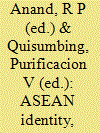

|
|
|
|
|
| Publication |
Quezon city (Phillpines)University of the Philippines Law center, UP Law Center and East-West Center Culture Learning Institute, 1981.
|
| Description |
xxx, 411p.hbk
|
|
|
|
|
|
|
|
|
|
|
|
Copies: C:1/I:0,R:0,Q:0
Circulation
| Accession# | Call# | Current Location | Status | Policy | Location |
| 022222 | 959/ANA 022222 | Main | On Shelf | General | |
|
|
|
|
| 2 |
ID:
123006
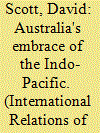

|
|
|
|
|
| Publication |
2013.
|
| Summary/Abstract |
This article argues that the 'Indo-Pacific' has become an increasingly influential term during the last few years within Australian strategic debate. Consequently, the article looks at how the concept of the 'Indo-Pacific' as a region is impacting on Australia's strategic discussions about regional identity, regional role, and foreign policy practices. The term has a strategic logic for Australia in shaping its military strategy and strategic partnerships. Here, the article finds that Australian usage of the term operates as an accurate description of an evolving 'region' to conduct strategy within, but also operates quite frequently (though not inevitably or inherently) as a more contested basis for China-balancing. The article looks closely at four themes: the Indo-Pacific as a term, the rhetoric (strategic debate) in Australia surrounding the Indo-Pacific term, the Indo-Pacific policy formulations by Australia, and the developing Indo-Pacific nature of bilateral and trilateral linkages between Australia, India, and the United States.
|
|
|
|
|
|
|
|
|
|
|
|
|
|
|
|
| 3 |
ID:
139268
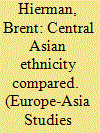

|
|
|
|
|
| Summary/Abstract |
In this article, I utilise a contextual understanding of ethnicity and unique data to demonstrate that the ethnic Uzbek identity category is both widely available and frequently a useful means of making sense of the world in both Kyrgyzstan and Tajikistan. While Uzbek ethnicity is generally salient in both states, the context in which it becomes so varies across space. In particular, there are significant urban–rural distinctions that affect when Uzbek ethnicity is utilised to interpret the world. In addition, compared to others, rural Tajikistani Uzbeks perceive that the boundary between Uzbeks and the titular groups is particularly permeable.
|
|
|
|
|
|
|
|
|
|
|
|
|
|
|
|
| 4 |
ID:
132408
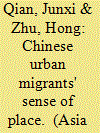

|
|
|
|
|
| Publication |
2014.
|
| Summary/Abstract |
In this paper, we study urban migrants' sense of place in Guangzhou, China, focusing on the structural relations between place attachment, identification and dependence as the three key place dimensions. Through both quantitative structural equation modelling and qualitative analysis of in-depth interviews data, our research suggests that migrants' sense of place demonstrates complex relationships between the three registers of emotional attachment, identity formation and functional dependence. The construction of sense of place is also related to the personal experiences of living as urban 'outsiders'. Our research also reveals a striking difference between the city and community levels in terms of the ways in which migrants' sense of place is constructed. Urban migrants tend to exploit the functional utilities of microscopic urban spaces to meet their demands for recreation, education and socialisation. On the other hand, their sense of place to the city is largely compromised by their attachment to the hometown and conditioned by their personal identification to the city.
|
|
|
|
|
|
|
|
|
|
|
|
|
|
|
|
| 5 |
ID:
055466
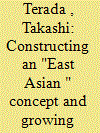

|
|
|
| 6 |
ID:
068523
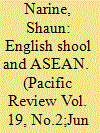

|
|
|
| 7 |
ID:
126660
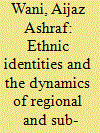

|
|
|
|
|
| Publication |
2013.
|
| Summary/Abstract |
The concept of regional and sub-regional identity as well as regional autonomy has captured the stage of Social Science. The regional autonomy aspirations and the sense of regional and sub-regional identity have offered a new dimension to the assertiveness of ethnic group. Regional identity demands in South and Southeast Asian societies have followed a uniform pattern. These regional autonomy demands evolved over a large span of time may be located in specific geographical and environmental spaces. At one level, these demands remained humane and inclusive, incorporating and reflecting broader human and universal values. At the other level, they acquired the traits of particularism which in the later stages of building multi-cultural and multi-ethnic nation states posed many problems. The plurality of politics is the hallmark of Jammu and Kashmir (J&K) State, and this polarity is essentially the result of cultural diversities that criss-cross the geographical and cultural landscape of Kashmir. The J&K State is not only a conglomerate of three distinct regions - Jammu, Kashmir, and Ladakh - but there are also regions within regions marked off from one another by geography, culture, and history. The politics of regional and sub-regionalism based on region, religion, caste, ethnicity, and so on continues to be stubbornly informed by their respective histories and cultures - thus the resistance against hegemony and the demand for sub-regional autonomies and Hill Development Councils. This article attempts at, looking into the dynamics of these assertions, its impact on the politics of the state, and to delineate the role of different socio-political and historical forces in shaping regional and sub-regional assertions in J&K without, however, suppressing the relative significance of different identity markers.
|
|
|
|
|
|
|
|
|
|
|
|
|
|
|
|
| 8 |
ID:
126661
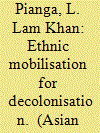

|
|
|
|
|
| Publication |
2013.
|
| Summary/Abstract |
This article attempts to communicate the methodological tension between subjectivity and objectivity by recording the aspiration of communities who are problematised both by colonialism and the modern nation-state. It highlights how colonial policy and practice contribute to the postcolonial imbroglio in Northeast India. It delineates how British colonial cartography always gave priority to 'administrative convenience' in the demarcation of boundaries, resulting in the division of ethnic community. It argues that Northeast India and the Indo-Burma borderland are not yet decolonised, as the government of India, without any rearrangement or alteration, adopts the colonial administrative boundaries, which divided ethnic communities. Neither the State Reorganisation Act (1956) nor the North-Eastern Areas (Reorganisation) Act (1971) fulfilled the aspiration of the segmented communities in the northeast, as they did in the mainland. The article also argues that the responses of the government of India towards the problems in Northeast India react to the manifested symptoms of the deep-rooted political problem rather than getting to the crux of the problem to find a solution.
|
|
|
|
|
|
|
|
|
|
|
|
|
|
|
|
| 9 |
ID:
120333
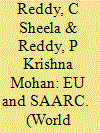

|
|
|
| 10 |
ID:
133963


|
|
|
|
|
| Publication |
2014.
|
| Summary/Abstract |
This article discusses the relationship between three language communities in Europe with variant levels of official recognition, namely Kashub, Sorb, and Silesian, and the institutions of their host states as regards their respective use, promotion, and revitalization. Most language communities across the world campaign for recognition within a geographic/political region, or on the basis of a historic/group identity to ensure their language's use and status. The examples discussed here illustrate that language recognition and policies resulting therefrom and promoting official monolingualism strengthen the symbolic status of the language but contribute little to the functionality of language communities outside the area. As this article illustrates, in increasingly multilingual societies, language policies cut off its speakers from the political, economic, and social opportunities accessible through the medium of languages that lack official recognition locally.
|
|
|
|
|
|
|
|
|
|
|
|
|
|
|
|
| 11 |
ID:
059814
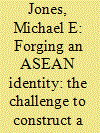

|
|
|
| 12 |
ID:
086553


|
|
|
|
|
| Publication |
2009.
|
| Summary/Abstract |
The aftermath of the Cold War has brought a shift in the West's position on the acceptance and promotion of international human rights standards in developing countries. In this context, the Association of Southeast Asian Nations (ASEAN) member countries challenge the West's position based on two contradictory principles - comprehensibility and cultural embedment of human rights. In this article, I argue that interactions with regard to human rights involving state and non-state actors in ASEAN have become part of the process of regional identity formation. How ASEAN has responded to external pressures in terms of compliance with international human rights norms, and how it has developed its own normative and procedural approach to human rights at the regional level, are inherent in the dynamics of `Self' definition. A mixed pattern of `rhetorical' and `communicative action' explains how interaction has led to different phases - differentiation, affirmation, contestation and re-orientation - in the dynamics of `Self' definition of ASEAN with regard to human rights.
|
|
|
|
|
|
|
|
|
|
|
|
|
|
|
|
| 13 |
ID:
151121
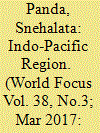

|
|
|
|
|
| Summary/Abstract |
Indo-Pacific region is not simply a geographical entity but a social construction characterised by intense engagement, shared institutional frameworks and cultural commonalities. The maritime geography has replaced the Atlantic as the nerve centre of economic, political, security and diplomatic interactions without transposing US preeminence ensuring a regional identity for India. Discharging responsibilities as a regional power is difficult for India in view of rising competition and protectionist policies of several affluent economies. Even so India has contrived to brace the challenges since the last decade which it needs to sustain for its triumphal entry into the emerging Asian Century.
|
|
|
|
|
|
|
|
|
|
|
|
|
|
|
|
| 14 |
ID:
127648


|
|
|
|
|
| Publication |
2014.
|
| Summary/Abstract |
Indonesia has approximately 240 million people, and more than 85% of the population are Muslims. Whilst incidents of religious intolerance have frequently been reported in the mass media, political Islam in Indonesia, represented by Islamic political parties, seems to have failed to gain popular support. Against this conflicting standing of Islam and Islamic organizations in Indonesia, this study focuses on Muslim religiosity and perceptions of the role of Islam in contemporary Indonesia. Based on our survey of 1500 Muslims in Indonesia in 2010, and case studies in regional Indonesia, this paper shows that, due to sociocultural change in regional Indonesia, and the diffusion of religious authority through media use, Indonesian Muslims are becoming less political Islamists, and more sociocultural Islamists who are attempting to advocate Islamic morality. This trend is in line with scholarly observations of post-Islamism prevalent in other parts of the Muslim world.
|
|
|
|
|
|
|
|
|
|
|
|
|
|
|
|
| 15 |
ID:
132934
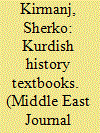

|
|
|
|
|
| Publication |
2014.
|
| Summary/Abstract |
This article reviews the history and social studies textbooks used in Kurdistan Regional Government (KRG) schools in terms of their contribution to the construction of the Kurdish/Kurdistani national identity. The article also examines how the KRG's views of the Other are expressed in these textbooks
in order to reveal the discourses, categories of differences, assumptions, and views about these concepts, as well as the attempts made through the text- books to answer the question of what it means to be a Kurd or a Kurdistani. As with nation-building projects elsewhere, KRG school textbooks are part of a strategy to create an "imagined community," and are intended to strengthen the process of creating a Kurdish/Kurdistani nation-state within an Iraqi nation-state.
|
|
|
|
|
|
|
|
|
|
|
|
|
|
|
|
| 16 |
ID:
115349
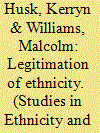

|
|
|
|
|
| Publication |
2012.
|
| Summary/Abstract |
In this article we examine the complex processes involved in small-scale ethnicity emergence and legitimation, and highlight the multi-dimensional elements present in moving from a strong regional identity to an externally legitimate ethnic group. We use Cornwall as a case study: administered as an English county, there has been a historic ethno-cultural movement for recognition alongside recent inclusion in national statistics; however, legitimation by external elites has been problematic. The first sections outline the Cornish as a group; we argue that however one conceptualises 'ethnicity', the people of Cornwall must constitute such a group. We examine the dichotomous effects of the interplay between strong regional assertion and a Cornish ethnicity more formally. In the latter sections we apply these arguments to broader sociological discussions around the legitimation of particular groups, and show that the Cornish are indicative of the wider theoretical literature. In conclusion, we assert that the Cornish are representative of the push/pull mechanisms felt acutely in any core/periphery power relations, and should be seen as central to emerging small-scale ethnic groups more generally.
|
|
|
|
|
|
|
|
|
|
|
|
|
|
|
|
| 17 |
ID:
119560


|
|
|
| 18 |
ID:
140655


|
|
|
|
|
| Publication |
London, Hurst and Company, 1999.
|
| Description |
xvi, 270p.: mapshbk
|
| Standard Number |
1850653976
|
|
|
|
|
|
|
|
|
|
|
|
Copies: C:1/I:0,R:0,Q:0
Circulation
| Accession# | Call# | Current Location | Status | Policy | Location |
| 042633 | 943/TAG 042633 | Main | On Shelf | General | |
|
|
|
|
| 19 |
ID:
087934
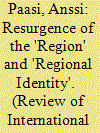

|
|
|
|
|
| Publication |
2009.
|
| Summary/Abstract |
'New regionalism', 'region', 'city-region', 'cross-border region', 'border' and 'identity' have become important catchphrases on the global geo-economic and geopolitical scene. The resurgence of these terms has been part of the transformation of both political economy and governance at supra-state, state and sub-state scales. Regions have been particularly significant in the EU where both the making of the Union itself and the 'Europe of regions' are concrete manifestations of the re-scaling of state spaces and the assignment of new meanings to territory. Such re-scaling has also led to increased competition between regions; a tendency that results from both the neo-liberalisation of the global economy and from a regionalist response. Regional identity, an idea at least implicitly indicating some cohesiveness or social integration in a region, has become a major buzzword. It has been particularly identified in the EU's cohesion policy as an important element for regional development. In spite of their increasing importance in social life and academic debates, regions, borders and identities are often studied separately, but this paper aims at theorising and illustrating their meanings in an integrated conceptual framework and uses the sub-state regions in Europe, and particularly in Finland, as concrete examples. Regions are conceptualised here as processes that gain their boundaries, symbolisms and institutions in the process of institutionalisation. Through this process a region becomes established, gains its status in the broader regional structure and may become a significant unit for regional identification or for a purported regional identity. This process is based on a division of labour, which accentuates the power of regional elites in the institutionalisation processes.
|
|
|
|
|
|
|
|
|
|
|
|
|
|
|
|
| 20 |
ID:
128029
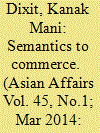

|
|
|
|
|
| Publication |
2014.
|
| Summary/Abstract |
With Partition and the rise of various different nationalisms there came the need to find a new name for what used to be called "British India". A framework for co-operation between the new countries was also needed. Initially regionalism was fashionable. But the regional organisation, SAARC, embodied cooperation between all the nation-states of the region, a veritable lowest common denominator rather than an additional layer of an inclusive regional identity for all the citizenry. The increasing use of "Southasia" is based on a recognition that even though India looms large, the region contains other countries with sizeable populations in a global context. But flesh must be put on the bones of the concept. The key is sub-regional commercial cooperation between viable units. There are many opportunities for cross-border economic activity, but what is needed is a porous border like the India/Nepal border, not a militarised border like the India /Pakistan border. Connectivity and bilateral free trade agreements will bring results and the Indian state of Punjab and the Pakistani province of Punjab are perhaps best placed to give an example of cooperation.
|
|
|
|
|
|
|
|
|
|
|
|
|
|
|
|
|
|
|
|
|